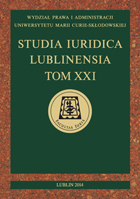Wywłaszczenie pośrednie i postępujące a ochrona inwestora w świetle międzynarodowego prawa inwestycyjnego
Indirect and creeping expropriation and investor’s protection under international investment law
Author(s): Michał BorsSubject(s): Civil Law, International Law, Economic policy, International relations/trade, Post-War period (1950 - 1989), Transformation Period (1990 - 2010), Present Times (2010 - today), Law on Economics
Published by: Wydawnictwo Naukowe Uniwersytetu Marii Curie-Sklodowskiej
Summary/Abstract: Respect for the rights of an investor’s ownership is one of the most important elements to be taken into account by an investor when deciding whether to launch an investment project in a third country. The purpose of this article is to discuss issues related to the institution of indirect and creeping expropriation in international investment law and to provide legal differences between these two institutions. In the following text, reference is made to the concept of direct expropriation known under domestic law, presenting differences about indirect and creeping expropriation, which are both unknown in Polish civil law. Differentiation of expropriation clauses shall require the presentation of how these institutions developed in public international law in the period after the World War II. The text analyses clauses present in international investment law contained in the universal treaties, regional treaties, agreements, multilateral agreements, as well as in bilateral investment treaties. The article presents the current law cases of international arbitration tribunals that have developed criteria that should be met to interpret state actions as indirect and creeping expropriation. In some cases, intervention by the state in the investor’s property is allowed for the purposes of economic regulation and is justified due to the public good or public welfare. The final part of the article discusses the category of such actions taken by the host country, known as the regulatory measures. These actions, under certain conditions, may be legal and carry no obligation to compensate.
Journal: Studia Iuridica Lublinensia
- Issue Year: 21/2014
- Issue No: 1
- Page Range: 181-203
- Page Count: 23
- Language: Polish

